The Cultural Significance of Confucius Temple Cemetery and Mansion in Chinese History
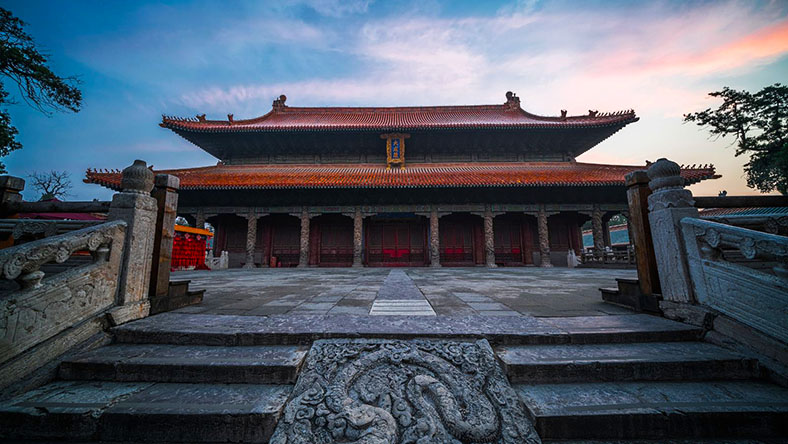
An Essential Guide to Visiting Confucius Temple Cemetery And Mansion
In This Guide
- An Essential Guide to Visiting Confucius Temple Cemetery And Mansion
- The Rich History and Legends of Confucius Temple Cemetery And Mansion
- Main Highlights: What You Absolutely Can’t Miss
- Planning Your Visit: A Practical Guide
- Tickets: Prices, Booking, and Tips
- How to Get There: A Complete Transportation Guide
- Local Cuisine and Accommodation Nearby
- Frequently Asked Questions
- Final Thoughts on Your Trip
Discovering the Heart of Confucian Heritage
Nestled in the tranquil city of Qufu, the Confucius Temple, Cemetery, and Mansion stand as a timeless testament to the enduring legacy of Confucius, the revered philosopher and educator whose teachings have shaped Chinese culture for centuries. This UNESCO World Heritage Site is not merely a collection of structures; it is a vibrant reflection of Confucianism’s profound influence on Chinese society, governance, and ethics.
As you step through the ornate gates of this grand complex, you’re greeted by a harmonious blend of architectural beauty and spiritual significance. Each building, from the majestic temple to the serene cemetery, tells a story that stretches back over two millennia. The Temple, the largest of its kind in China, captures the essence of Confucian worship, while the nearby Mansion provides a glimpse into the life of Confucius’ descendants, who have preserved his teachings through the ages.
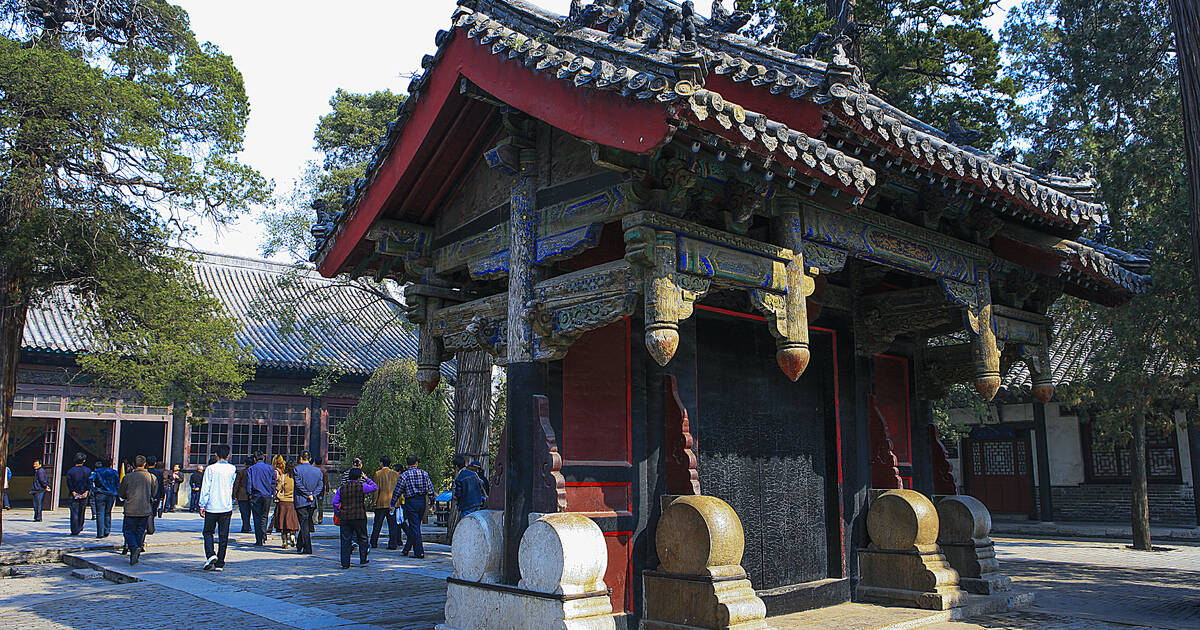
Confucius Temple Cemetery And Mansion.
Here’s what you can expect during your visit:
- Rich History and Culture: Gain insights into Confucius’ life and teachings, which laid the groundwork for a philosophy that still resonates today.
- Architectural Marvels: Marvel at the intricate designs of ancient Chinese architecture, adorned with symbols and carvings that tell stories of the past.
- Serene Environment: Wander through the peaceful grounds of the cemetery, where Confucius and his family are laid to rest, and reflect on the values of respect and filial piety that he championed.
- Guided Tours: Enhance your experience by engaging with knowledgeable guides who can bring the history and significance of this site to life.
Embarking on a journey to the Confucius Temple, Cemetery, and Mansion is not just a visit to a historical site; it’s an opportunity to connect with the philosophical roots of a civilization that has inspired millions. Whether you are a history buff, a culture enthusiast, or simply seeking a meaningful experience, this sacred site promises to deepen your understanding of Chinese heritage.
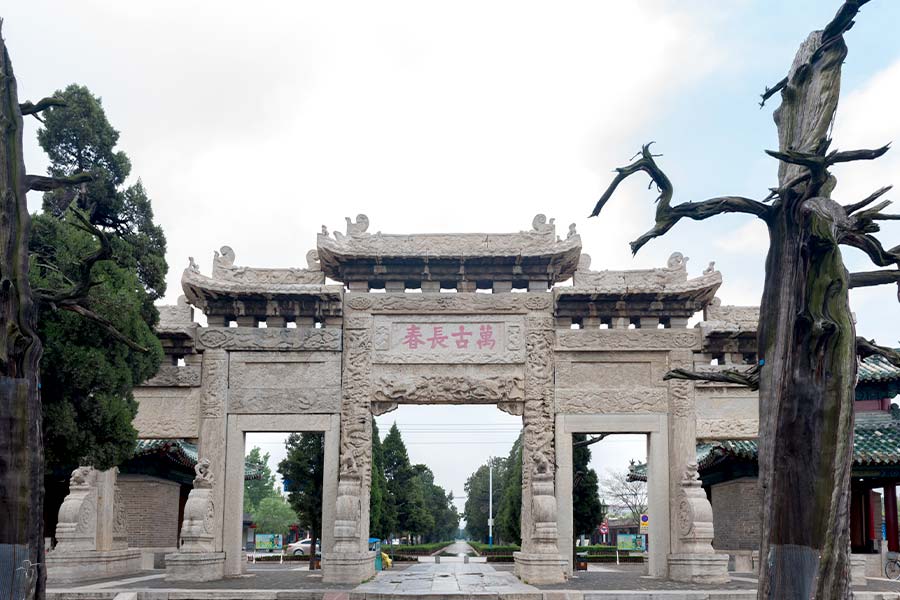
Confucius Temple Cemetery And Mansion.
The Rich History and Legends of Confucius Temple Cemetery And Mansion
Nestled in the heart of Qufu, the Confucius Temple, Cemetery, and Mansion form a historic triad that serves as a testament to the life, teachings, and enduring legacy of Confucius, one of the most revered philosophers in Chinese history. Visiting this remarkable complex is not just a journey into the past; it’s an immersion into the rich tapestry of Confucian thought and its profound influence on Chinese culture.
The Confucius Temple: A Sanctuary of Wisdom
Dating back to 478 BC, shortly after Confucius’s death, the Confucius Temple (孔庙) is the most significant of its kind in China. Originally built to honor Confucius, it has undergone numerous renovations and expansions through various dynasties, particularly during the Tang (618-907 AD), Song (960-1279 AD), Ming (1368-1644 AD), and Qing (1644-1912 AD) periods. The temple is not merely an architectural marvel; it stands as a symbol of the respect and reverence afforded to Confucian ideals throughout history.
Among its many features, the temple houses a striking collection of stelae and inscriptions that chronicle the evolution of Confucianism over centuries. Visitors can marvel at the Great Tang Gifted Master Lu Guo Kong Xuan Gong Stele from 668 AD and other significant inscriptions that date back to the Han Dynasty. Each monument tells a story, encapsulating the wisdom of ages past and the deep-seated values of ethics, education, and social harmony that Confucius championed.
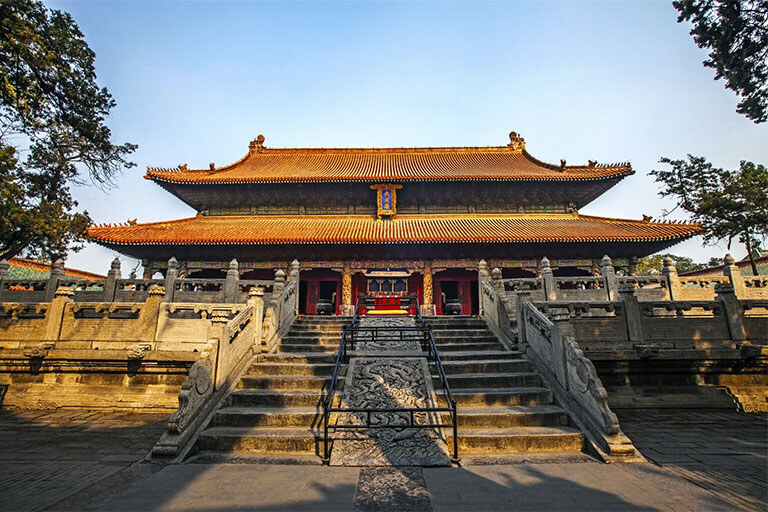
Confucius Temple Cemetery And Mansion.
The Kong Family Mansion: Echoes of an Aristocratic Legacy
Adjacent to the temple lies the Kong Mansion (孔府), the ancestral home of Confucius’s descendants. This sprawling complex, which showcases traditional Chinese architecture, served not only as a residence but also as a center for learning and governance for over 2,000 years. The mansion reflects the aristocratic status of the Kong family, who held significant political and social influence in China, particularly during the Ming and Qing dynasties.
Exploring the Kong Mansion reveals a labyrinth of courtyards and halls, each meticulously adorned with wood carvings and intricate details. The stories of Confucius’s descendants, who were often scholars and officials, imbue the space with a sense of continuity and tradition. Here, visitors can gain insights into the daily lives of Confucius’s family and the societal roles they played in perpetuating his teachings.
Confucius Cemetery: A Resting Place of Reverence
The Confucius Cemetery (孔林), also known as Kong Lin, is a serene and sacred site where Confucius and many of his descendants are buried. Established in 479 BC, the cemetery is one of the oldest and most significant in China. It features lush greenery and ancient cypress trees, creating a tranquil setting that invites reflection.
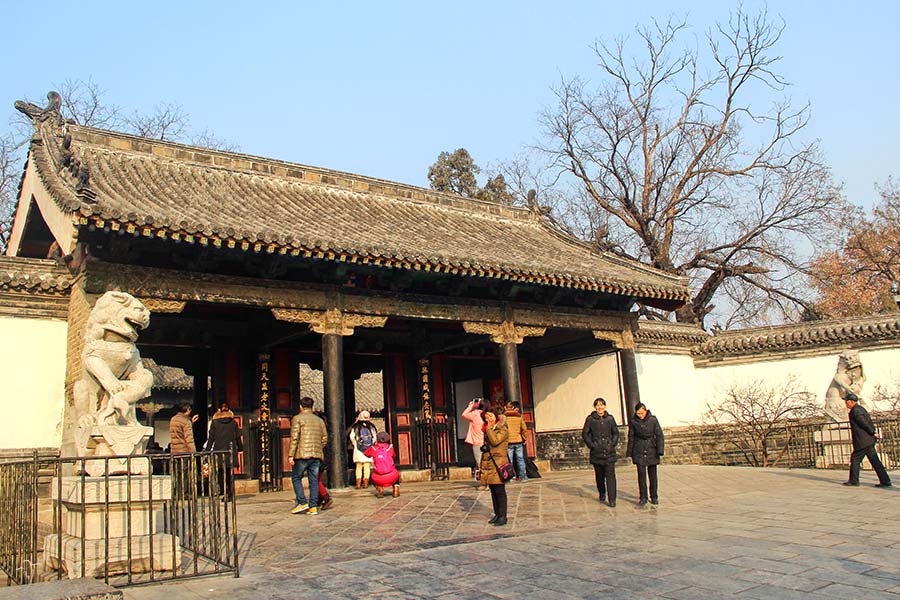
Confucius Temple Cemetery And Mansion.
Legend has it that Confucius himself chose the site for his burial, a testament to its spiritual significance. The cemetery is home to over 100,000 tombs, including those of Confucius’s descendants, making it a notable repository of Confucian history. Visitors often pay their respects at the main tomb, adorned with offerings of incense and flowers, embracing the customs that have persisted for centuries.
Legends and Cultural Significance
The stories surrounding Confucius and his legacy are as rich as the sites themselves. One popular legend tells of a mystical encounter Confucius had with a dragon while meditating by the Luo River, symbolizing wisdom and transformation. This encounter is believed to have inspired his teachings on virtue and morality.
Moreover, the Confucius Temple’s annual ceremonies attract thousands of visitors, particularly during the Confucius Birthday celebrations on September 28, where worshippers and scholars gather to honor his teachings. The rituals, which include music and dance, reflect the deep cultural significance of Confucianism in contemporary China.
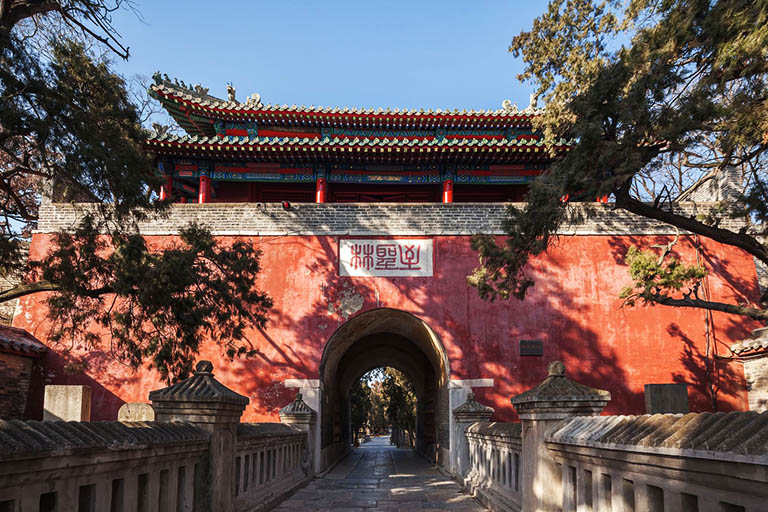
Confucius Temple Cemetery And Mansion.
Conclusion
Exploring the Confucius Temple, Cemetery, and Mansion offers a profound glimpse into the heart of Chinese civilization. Each structure and every inscription resonates with the teachings of Confucius, inviting travelers to reflect on the values of respect, education, and ethical leadership that continue to shape Chinese society today. Whether you are a history enthusiast, a seeker of knowledge, or simply a curious traveler, this sacred complex in Qufu is an essential destination that promises to enlighten and inspire.
Main Highlights: What You Absolutely Can’t Miss
Discovering the Essence of Confucian Heritage in Qufu
Visiting the Confucius Temple Cemetery and Mansion (曲阜孔庙、孔府及孔林) is an enriching journey into the heart of Chinese philosophy and history. This grand complex is not just a tribute to Confucius, the revered philosopher and educator; it is a living testament to the enduring legacy of Confucian thought. Here are the main highlights you simply cannot miss during your exploration of this remarkable site.
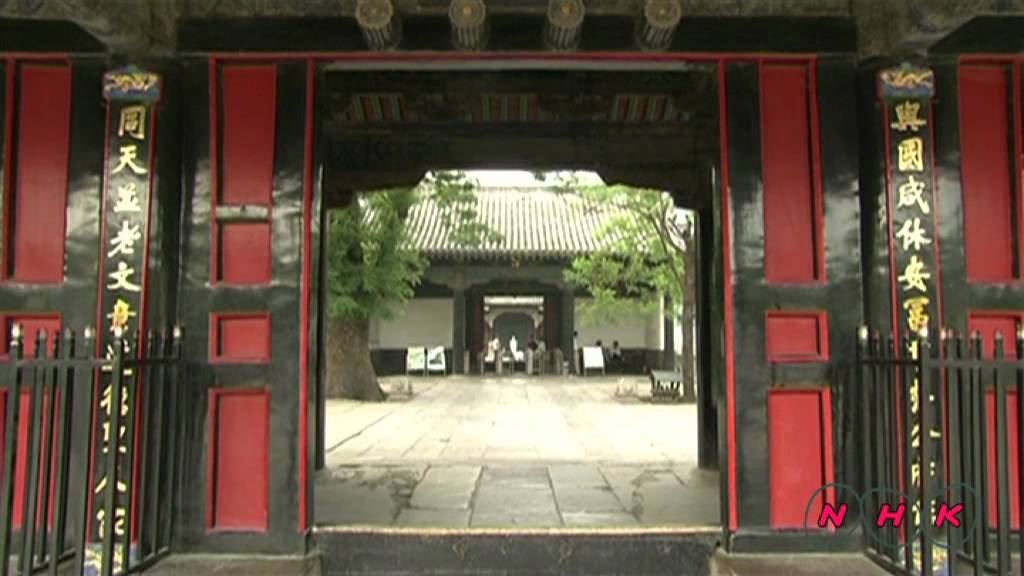
Confucius Temple Cemetery And Mansion.
1. Confucius Temple (孔庙)
- Architectural Marvel: The Confucius Temple is one of the largest and most significant Confucian temples in China, showcasing stunning traditional architecture that dates back to the Han Dynasty.
- Cultural Significance: As a site of worship and respect, this temple has been a pilgrimage destination for scholars and Confucian disciples since its establishment over 2,500 years ago.
- Key Features: Don’t miss the Great Hall of the Temple, which houses a statue of Confucius and various stone tablets inscribed with his teachings. The intricate carvings and serene atmosphere create an inspiring environment for reflection.
2. Kong Family Mansion (孔府)
- Historical Insight: The Kong Family Mansion served as the residence of Confucius’s descendants and is a fine example of traditional Chinese residential architecture. It offers a glimpse into the life and customs of one of China’s most influential families.
- Exquisite Artifacts: Wander through the rooms filled with historical artifacts, including royal seals, ancient manuscripts, and ornate furniture that once belonged to the Kong family.
- Guided Tours: Hiring an English-speaking guide can greatly enhance your experience, providing context and stories that bring the mansion’s history to life.
3. Confucius Cemetery (孔林)
- Peaceful Atmosphere: The cemetery is the final resting place of Confucius himself, along with many of his descendants. The tranquil setting, adorned with ancient trees and stone pathways, invites quiet contemplation.
- Notable Tombs: Be sure to visit the prominent Tomb of Confucius, marked by a simple yet dignified mound. The surrounding area is dotted with elegant stelae that preserve inscriptions from various dynasties.
- Cultural Practices: Observe the rituals and practices performed by visitors who come to pay their respects, offering insights into enduring Confucian values.
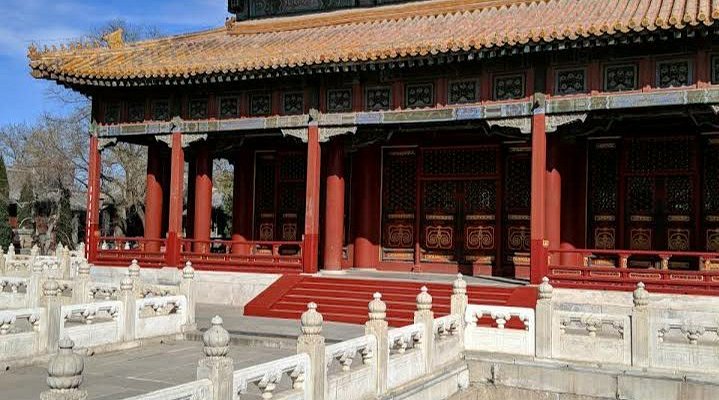
Confucius Temple Cemetery And Mansion.
4. The Steles and Inscriptions
- Historical Treasures: The site is renowned for its collection of stone steles, some dating back to the Tang Dynasty. These inscriptions document significant historical events and honor various emperors and scholars.
- Diverse Heritage: Look for the Yiying Stele and Reiki Stele, which highlight the influence of Confucianism across different dynasties, showcasing the deep-rooted respect for education and morality in Chinese culture.
5. Closing-of-the-Gate Ceremony
- Cultural Experience: If you visit in the late afternoon, don’t miss the enchanting closing-of-the-gate ceremony at 5 PM, where participants wear traditional costumes, creating a colorful spectacle that celebrates Confucian heritage.
- Engaging Atmosphere: This event, while somewhat theatrical, provides a lively atmosphere, connecting visitors to the rich cultural traditions of China.
6. Local Cuisine and Shopping
- Gastronomic Delights: After your explorations, treat yourself to local delicacies at nearby restaurants such as Cafe Kong or GuiBin Lou, where you can savor authentic Chinese flavors.
- Souvenir Shopping: Explore local markets for unique souvenirs, including handicrafts and books on Confucian philosophy, allowing you to take a piece of this cultural experience home with you.
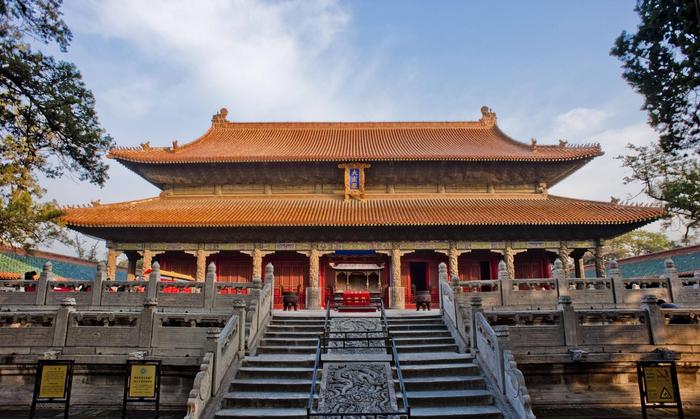
Confucius Temple Cemetery And Mansion.
Conclusion
The Confucius Temple Cemetery and Mansion is more than just a historical site; it is a profound exploration of Chinese heritage and the philosophical teachings of Confucius. Each corner of this complex reveals layers of history and wisdom that continue to influence modern society. Whether you are a history buff, a philosophy enthusiast, or simply seeking a deeper understanding of China’s cultural roots, this destination is an absolute must-visit on your journey through Qufu.
Planning Your Visit: A Practical Guide
Essential Tips for Your Visit to Confucius Temple Cemetery and Mansion
Embarking on a journey to the Confucius Temple, Cemetery, and Mansion in Qufu is a profound way to connect with China’s rich philosophical and historical heritage. Here’s your practical guide to ensure a rewarding experience as you explore this significant cultural site.
Opening Hours and Admission
- Hours of Operation: The complex is open daily from 8:00 AM to 5:00 PM. Arriving early can help you avoid crowds and enjoy a more tranquil experience.
- Tickets: Admission typically includes access to all three main sites: the Confucius Temple, the Kong Family Mansion, and the Confucius Cemetery. It’s advisable to purchase your tickets upon arrival to avoid any potential lines.
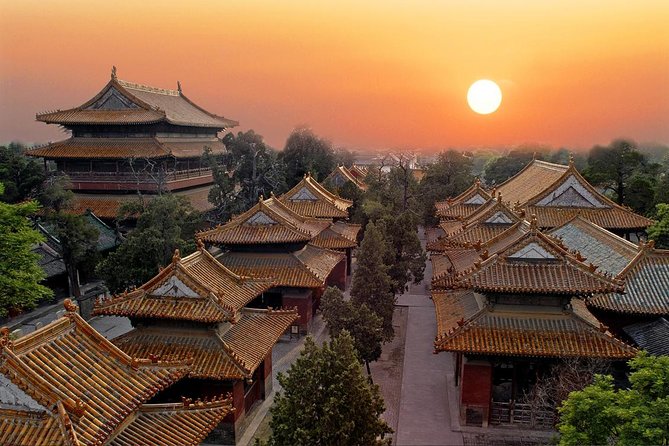
Confucius Temple Cemetery And Mansion.
Getting There
- Location: The complex is located at Shendao Road, Qufu 273100, China.
- Transportation:
- Public Transport: Buses and taxis are readily available from nearby cities.
- Walking: If you’re staying within Qufu, the sites are within walking distance of each other, making it easy to explore the area on foot.
What to Expect
- Historical Significance: This UNESCO World Heritage site is dedicated to Confucius, who profoundly influenced Chinese culture and philosophy. The temple is renowned for its significant architectural elements and numerous inscriptions that date back to various dynasties.
- Complex Layout: The site consists of three main attractions:
- Confucius Temple: The largest of its kind in China, it showcases stunning architecture and sacred spaces.
- Kong Family Mansion: The residence of Confucius’ descendants, offering insights into the life and legacy of the philosopher’s family.
- Confucius Cemetery: A serene place where Confucius and many of his descendants are buried, featuring ancient gravestones and stelae.
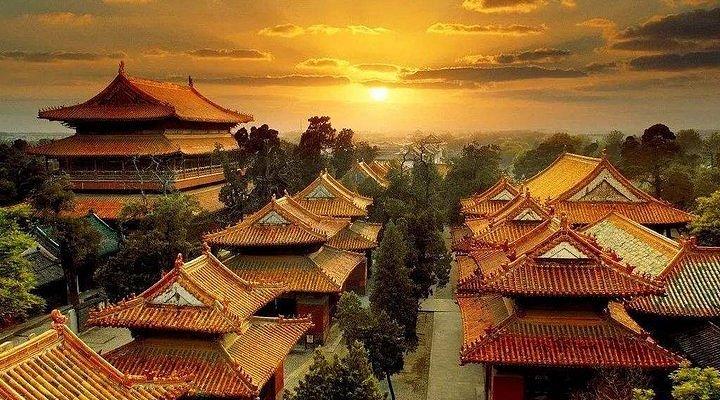
Confucius Temple Cemetery And Mansion.
Tips for an Enriching Experience
- Guided Tours: Consider hiring an English-speaking guide to enhance your understanding of the rich history and significance of the sites. This can transform your visit from a mere sightseeing trip into an enlightening exploration.
- Cultural Etiquette: While visiting, be respectful of the local customs. The temple is a place of reverence, and it’s important to maintain a quiet demeanor.
- Photography: Capture the beauty of the architecture, but be mindful of any restrictions in sacred areas.
Nearby Attractions
- After exploring the temple complex, take some time to visit other nearby sites, such as:
- Kong Mansion: Just a short walk away, this mansion is steeped in history and provides a glimpse into the life of the Confucius family.
- Kong Forest: This expansive forest offers a peaceful retreat and is home to many ancient trees, creating a perfect spot for reflection.
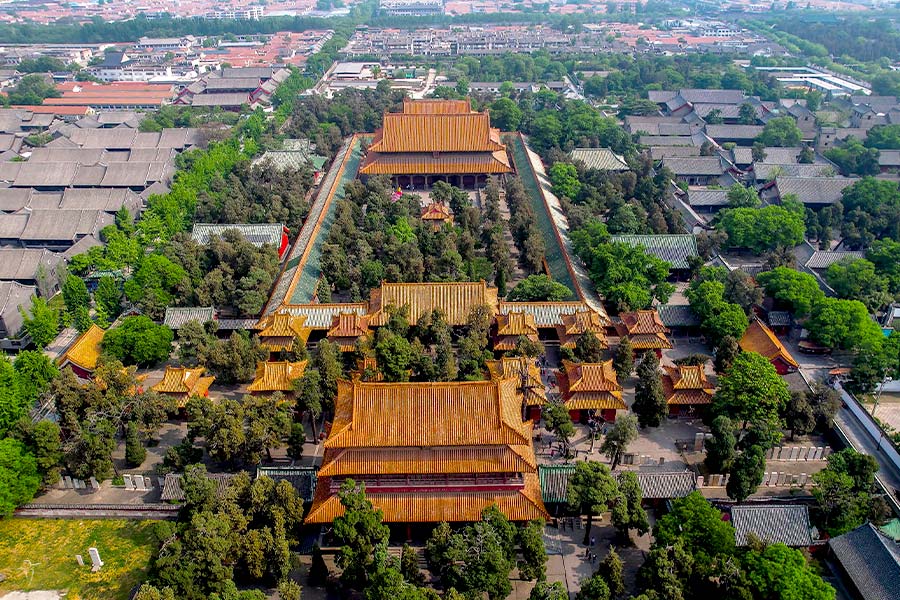
Confucius Temple Cemetery And Mansion.
Dining Options
- Various restaurants are located within a short distance of the temple complex. Some recommended places include:
- Cafe Kong (0.7 mi): Offers a mix of international cuisine in a casual setting.
- Shang Palace (0.7 mi): A cozy spot for Cantonese dishes.
- GuiBin Lou Restaurant (0.2 mi): Serves traditional Chinese cuisine.
Final Thoughts
Visiting the Confucius Temple, Cemetery, and Mansion is not just an opportunity to admire historical architecture; it’s a chance to immerse yourself in the teachings and legacy of one of history’s greatest philosophers. With this guide, you are well-equipped to make the most of your visit to this remarkable site in Qufu. Enjoy your journey through time and philosophy!

Confucius Temple Cemetery And Mansion.
Tickets: Prices, Booking, and Tips
When planning your visit to the Confucius Temple Cemetery and Mansion in Qufu, it’s essential to be well-informed about ticket prices, booking options, and helpful tips to enhance your experience. This sacred site, deeply rooted in Chinese history and culture, deserves a thoughtful approach to your visit.
Ticket Information
- General Admission Price: A standard ticket for entry is approximately RMB 150 (around USD 23). This ticket grants access to the entire complex, including the Confucius Temple, the Kong Family Mansion, and the Confucius Cemetery.
- Discounted Rates: Reduced tickets are available for students (with valid ID) and seniors, typically priced at RMB 75 (around USD 11.50). Children under the age of 1.2 meters may enter for free.
- Guided Tours: Consider investing in a guided tour, which often includes a ticket. Prices for guided tours can range from RMB 200 to RMB 400 (approximately USD 30 to USD 60), depending on the tour’s duration and inclusions.
Booking Options
- On-site Purchase: Tickets can be purchased directly at the entrance. However, during peak seasons or holidays, lines can be long, so arrive early.
- Online Reservations: To skip the queue, consider booking your tickets online through platforms like Ctrip or the official Qufu tourism website. Online booking often allows for discounts and guarantees your entry.
- Tour Packages: Many travel agencies offer comprehensive packages that include transportation, tickets, and guided tours, providing a hassle-free experience.
Visiting Tips
- Best Time to Visit: Aim to visit early in the morning or later in the afternoon to avoid crowds. The site is particularly serene during these hours, allowing for a more reflective experience.
- Engage a Guide: An English-speaking guide can significantly enhance your understanding of the site’s history and cultural significance. This is especially recommended for international travelers unfamiliar with Confucian traditions.
- Explore Nearby Attractions: After visiting the temple, take time to explore the nearby Kong Family Mansion and the Confucius Cemetery. These sites are within walking distance and offer further insight into Confucian heritage.
- Cultural Etiquette: While visiting, be respectful of the site’s sanctity. Dress modestly and maintain a quiet demeanor, especially in areas designated for worship or reflection.
- Plan for the Closing Ceremony: If you’re there in the late afternoon, don’t miss the closing-of-the-gate ceremony, which is both entertaining and culturally enriching.
Practical Information
- Opening Hours: The complex is open daily from 8:00 AM to 5:00 PM. It’s advisable to check for any seasonal changes in hours before your visit.
- Location: The Confucius Temple is located on Shendao Road, Qufu 273100, China. It’s easily accessible by public transport or taxi.
By following these guidelines, you can ensure a fulfilling visit to the Confucius Temple Cemetery and Mansion, immersing yourself in the profound legacy of one of China’s most influential philosophers. Enjoy your journey through history!
How to Get There: A Complete Transportation Guide
Navigating Your Way to the Confucius Temple, Cemetery, and Mansion
Visiting the Confucius Temple, Cemetery, and Mansion in Qufu is a journey not just through space but also through the profound depths of Chinese history and culture. Located in Shandong Province, this UNESCO World Heritage site is accessible from various points, making it relatively easy to reach for international travelers eager to immerse themselves in the teachings of one of history’s greatest philosophers.
Getting to Qufu
By Air:
The nearest major airport to Qufu is Jinan Yaoqiang International Airport (TNA), located approximately 130 kilometers (about 81 miles) away. From the airport, you have a couple of options:
- Train: Take the airport shuttle bus to Jinan West Railway Station, where you can catch a high-speed train to Qufu. The train journey takes about 30 minutes.
- Taxi: Alternatively, you can hire a taxi from the airport directly to Qufu, which will take around two hours depending on traffic.
By Train:
Qufu has its own railway station, making it easily accessible by train from several major cities:
- High-speed Trains: If you’re coming from Beijing, Shanghai, or Jinan, high-speed trains are a convenient option, with travel times ranging from 2.5 to 5 hours depending on your departure city.
- Regular Trains: Regular train services are also available, though they take longer and may be less comfortable.
Local Transportation in Qufu
Once you arrive in Qufu, getting around to the Confucius Temple complex is straightforward:
Walking:
The Confucius Temple, Cemetery, and Mansion are located in close proximity to each other, making walking a pleasant way to explore the area. The scenic streets of Qufu provide a charming backdrop as you stroll from one site to the next.
Bicycle Rentals:
For a more leisurely exploration, consider renting a bicycle. Several shops near the train station offer rentals, allowing you to cover more ground while enjoying the fresh air.
Taxis and Rideshares:
If you prefer not to walk, taxis are widely available throughout Qufu. Rideshare apps like Didi Chuxing can also be used for convenient transportation. Fares are generally affordable, making this a good option for small groups or those with mobility concerns.
Tips for Your Journey
- Guide Services: Hiring an English-speaking guide can greatly enhance your visit. They can provide invaluable insights into the rich history and significance of the sites.
- Timing Your Visit: The temple complex is open daily from 8:00 AM to 5:00 PM. Arriving early can help you avoid crowds and allow you to fully absorb the tranquil atmosphere.
- Plan for the Closing Ceremony: If you’re there in the late afternoon, don’t miss the closing-of-the-gate ceremony, which is both colorful and entertaining.
Nearby Attractions
While in Qufu, consider extending your visit to other nearby historical sites, including:
- Kong Mansion: Just a short walk from the temple, this ancestral home of Confucius’s descendants offers a glimpse into the life of the philosopher’s family.
- Confucius Cemetery: A serene place of rest for Confucius and his descendants, it’s an essential part of the Confucian pilgrimage.
With its rich history and cultural significance, visiting the Confucius Temple, Cemetery, and Mansion is a remarkable experience that deepens your understanding of China’s philosophical heritage. Plan your journey thoughtfully, and you will leave with not just memories, but a greater appreciation for the wisdom of Confucius.
Local Cuisine and Accommodation Nearby
Savoring Qufu: Culinary Delights and Comfortable Stays
As you immerse yourself in the profound history of the Confucius Temple, Cemetery, and Mansion, don’t miss the opportunity to indulge in the local cuisine and find a comfortable place to rest. Qufu offers a delightful selection of dining options and accommodations to enhance your cultural experience.
Local Cuisine
Qufu’s culinary scene reflects its rich heritage and local ingredients. Here are some top dining spots to enjoy:
-
Cafe Kong
Rating: 4.9/5
Located just 0.7 miles from the temple complex, this café offers a modern twist on classic dishes. With its international menu and vibrant atmosphere, it’s a perfect stop for a refreshing break. Enjoy their signature coffee blends and light bites in a cozy setting. -
Shang Palace
Rating: 4.3/5
About 0.7 miles from the Confucius Temple, this restaurant specializes in Cantonese cuisine. The elegant décor and attentive service make it an excellent choice for a more formal dining experience. Don’t miss their dim sum and signature seafood dishes. -
GuiBin Lou Restaurant
Cuisine: Chinese, Cantonese
Just a short 0.2-mile walk from the temple, this restaurant offers a range of traditional Chinese dishes. Its welcoming atmosphere and local flavors provide a taste of authentic Qufu dining. -
Kongjia Restaurant
Rating: 3.0/5
Located 0.7 miles from the temple, this restaurant offers a casual setting to enjoy classic Chinese fare. A good option for families or groups looking for a hearty meal after a day of exploration. -
TianXiang XianYu Guan
Distance: 0.8 miles
If you’re a seafood lover, this restaurant is a must-visit. Known for its fresh fish and seafood dishes, it provides a delightful culinary experience with a local twist.
Accommodation Nearby
After a day of exploring the philosophical roots of Confucianism, unwind in one of Qufu’s comfortable accommodations:
-
Qufu Hotel
Rating: 3.0/5
Situated just 0.4 miles from the temple complex, this hotel combines convenience with decent amenities. While it may not be the most luxurious option, it offers a practical base for your travels in Qufu. -
Kong Family Mansion Hotel
This hotel is renowned for its proximity to the Confucius Temple and offers a unique experience steeped in local culture. Enjoy traditional architecture and hospitality while being just a stone’s throw away from the major attractions. -
Lijing Hotel
Located about 0.5 miles from the temple, this hotel boasts modern amenities and comfortable rooms. It’s an excellent choice for travelers seeking a blend of comfort and accessibility to historical sites. -
Hanting Hotel Qufu
A budget-friendly option that offers clean, comfortable rooms at competitive rates. Located within easy reach of the temple complex, it’s ideal for travelers prioritizing convenience.
Conclusion
Whether you’re savoring the culinary delights of Qufu or resting in one of its welcoming accommodations, the city provides a perfect complement to the rich historical experience of the Confucius Temple, Cemetery, and Mansion. Enjoy your journey through time and taste!
Frequently Asked Questions
Common Queries about the Confucius Temple Cemetery and Mansion
1. What are the opening hours for the Confucius Temple Cemetery and Mansion?
The complex is open daily from 8:00 AM to 5:00 PM. It is advisable to arrive early to fully explore the extensive grounds without the crowds.
2. How much does it cost to enter the Confucius Temple and its associated sites?
The entrance fee typically covers access to the Confucius Temple, the Kong Family Mansion, and the Confucius Cemetery. Prices may vary, so check local listings or inquire at the entrance.
3. Is it necessary to hire a guide for my visit?
While it is possible to explore the sites independently, hiring an English-speaking guide is highly recommended. A guide can provide deeper insights into the historical significance and cultural context of the complex, enhancing your experience.
4. What is the significance of the Confucius Temple?
The Confucius Temple is one of the largest and most important Confucian temples in China. It honors Confucius, the esteemed philosopher and educator, and has been a site of worship for over two millennia. The temple complex showcases stunning architecture and numerous historical artifacts.
5. Are there any special events or ceremonies that take place at the temple?
Yes! One notable event is the closing-of-the-gate ceremony, which occurs at 5 PM. This colorful ceremony features traditional costumes and is a delightful spectacle for visitors.
6. What should I expect in terms of crowds?
The Confucius Temple complex can get busy, especially during weekends and holidays. However, its spacious layout allows for a comfortable visit even when many tourists are present. Visiting early in the day can help avoid peak crowds.
7. Are there dining options nearby?
Yes, there are several restaurants and cafes within a short distance from the Confucius Temple. Options range from traditional Chinese cuisine to international fare, ensuring that visitors can find something to satisfy their tastes.
8. What other attractions are located nearby?
In addition to the Confucius Temple, you can explore the Kong Family Mansion and Kong Forest, both within walking distance. Other nearby attractions include the Former Residence of Confucius and various historic sites that reflect the rich history of Qufu.
Final Thoughts on Your Trip
As you conclude your journey through the sacred grounds of Qufu, the birthplace of Confucius, take a moment to reflect on the profound wisdom and cultural heritage that permeate the air. The Confucius Temple, Cemetery, and Mansion stand as a testament to the enduring legacy of one of history’s greatest philosophers, offering not only a glimpse into ancient China but also insights that resonate in our modern world.
Embrace the Lessons of Confucius
Here are a few takeaways to cherish as you depart:
- Understanding of Harmony: Confucianism emphasizes balance and harmony, principles that can be applied in our daily lives, fostering better relationships and understanding among diverse cultures.
- Respect for Tradition: The intricate architecture and historical artifacts remind us of the importance of preserving our cultural heritage and learning from the past.
- Value of Education: Confucius believed in the power of education as a means to personal and societal improvement. This site inspires us to pursue knowledge and wisdom throughout our lives.
Recommendations for Future Visits
- Engage a Guide: For a richer experience, consider hiring a knowledgeable guide who can illuminate the complexities of Confucian philosophy and the significance of each monument.
- Visit in the Evening: If possible, plan your visit to include the enchanting closing-of-the-gate ceremony. The vibrant costumes and age-old traditions are a splendid way to end your day in Qufu.
- Explore Surroundings: Don’t miss the nearby attractions, such as the Kong Mansion and Kong Forest, which further deepen your understanding of this cultural epicenter.
A Journey Worth Taking
Your visit to the Confucius Temple, Cemetery, and Mansion is more than just a sightseeing trip; it’s an invitation to engage with the philosophical foundations that have shaped Chinese civilization and continue to influence the world today. As you leave, carry with you the wisdom of Confucius and share it with others, ensuring that his teachings remain alive across generations and cultures. Safe travels, and may your next adventure be just as enlightening!